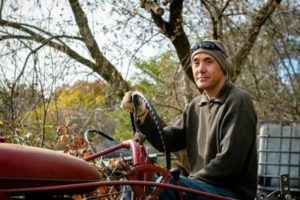In the News: Farm Ops Featured in Veteran’s Day Podcast

Dean Koyanagi joined the Cornell Small Farms Program in 2015 to work with fellow veterans interested in agriculture.
Casey Martin / Ithaca Times
In honor of Veteran’s Day, Cornell Cooperative Extension’s (CCE) podcast Extension Out Loud sat down with our own Dean Koyanagi to discuss the myriad programs and resources available to veterans interested in agriculture. A Marine Corps Veteran himself, Koyanagi joined the Cornell Small Farms Program to lead the Farm Ops project and support fellow veterans.
The Farm Ops project significantly grew after the 2014 Farm Bill passed, which included USDA-approved programs use of GI funding.
“They’re starting to figure out ways to use the GI Bill towards education towards agriculture,” Koyanagi explained during the podcast. “You can go to Cornell University and get your degree, which some of our veterans have, which is fantastic. And, others who don’t feel that that’s their route, they’re trying to figure out how to use that GI Bill for apprenticeships.”
Currently, the only approved apprenticeship program to use the GI Bill funding for is the Dairy Grazing Apprenticeship program. In New York, extension specialist Fay Benson is the point of contact for interested Veterans.
Similar to apprenticeships, Koyanagi helped to create on-the-job training programs. In these, farmers can work with a veteran for two years while paying a training wage. GI funds can then be used for housing stipends, which combines for a financially feasible transition into farming.
Veterans are often drawn to farming post-service because of the opportunity for entrepreneurship and a chance to continue their strong work ethic, Koyanagi explained. He thinks it is because veterans often want to live in rural communities, raise families, and have a slower pace of life.
With new farms come new challenges, and this is where some of the Farm Ops training programs assist farmer veterans.
The Farm Ops training programs are offered throughout different regions in New York. One course is through the National Center for Appropriate Technology (NCAT) Armed to Farm Program, which teaches sustainable agricultural practices in a week-long course. Currently, Koyanagi and our other Veteran Program Associate, Shaun Bluethenthal, just finished up Armed to Farm 2.0, which brought together farmer veterans who had already taken the first class or had been farming for five or more years.
Other training programs through Farm Ops are offered by partnering with local extension associates and other farms. For example, a trial horticulture therapy program is offered in partnership with Equicenter where classes are hosted for veterans to connect with a nutritionist, learn to grow food, eat, and have lunch together.
“For some of the people going through the VA programs, they’re finding that that is a really great breakout of the standard treatment protocols where you might just get a lot of therapy and see a doctor,” Koyanagi said of the trial program. “Now, you’re going out and actually thinking about what you’re doing in your life or taking care of yourself.”
Some additional resources include scholarships for veterans interested in taking our program’s online courses.
Koyanagi finishes the podcast interview by emphasizing the importance of self-reporting that you are a veteran when seeking resources through Cornell Cooperative Extension, the Cornell Small Farms Program, and other programs.
“Please tell them you’re a veteran because they can’t ask in some situations,” Koyanagi advised. “So, they can’t direct you to those programs if they don’t know that you’re a veteran.”
To learn more about the the Farm Ops program and resources available to veterans in agriculture, listen to the podcast.

